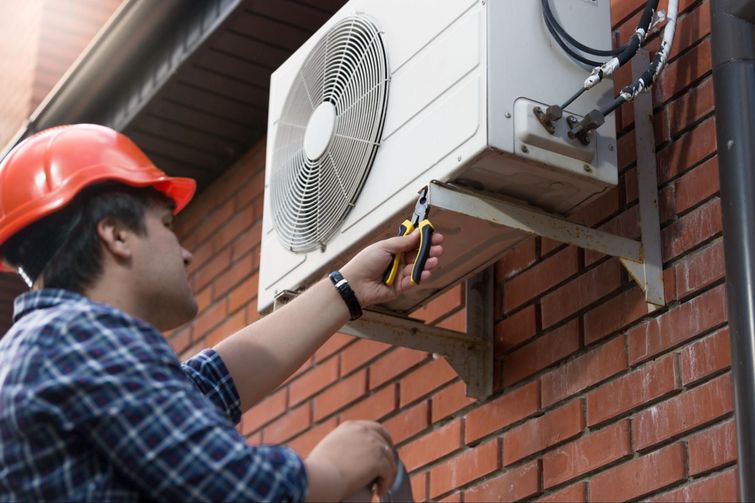The city of Toronto is home to hot summers and colder winters. Maintaining a comfortable living temperature throughout the years and various types of weather can be quite the feat. Whether you own your home or you rent, a stable air conditioning unit is essential during the summer months.
Affordable housing in Ontario, especially in the city of Toronto often means renting from a landlord. When it comes to tenants and landlords, there are a lot of questions about who is responsible for things like air conditioners, heating, and other appliances.
With record high temperatures in parts of Canada, having cool air can help you stay healthy and happy. In fact, it can even be quite dangerous to not have air conditioning when a heatwave hits. Knowing the general legal information regarding your AC unit when you rent is important.
Here are some quick facts that break down the rules and responsibilities for landlords and tenants involving air conditioning units.
Look at your lease agreement and the bylaws
One of the first things you should do any time there is a question about the rights of a landlord or tenant is to look at the lease and tenancy agreement.
Lease or tenancy agreement
Most leases contain the rules, regulations, conditions, and general information for the specific rental unit and area in writing. They will also include what is or is not permitted in certain apartment buildings or rental properties.
While things may change depending on your particular situation, the lease agreement is the best first step.
It is likely that if there are questions or concerns about air conditioning, heat, or electricity in the rental unit, there will be answers in the agreement. Whether that means that the landlord has control of the air conditioner or if the tenant can have their own unit installed, there should be answers there.
The bylaw rules
Another step to take when dealing with concerns of heat or electricity is to consider the bylaws and building codes in the area. These laws and restrictions will help tenants understand their options when it comes to installing appliances and dealing with landlords. Following the law will help renters and landlords stay out of trouble and avoid more costs along the way.
Do landlords have to supply air conditioners?
While a landlord cannot interfere with a tenant’s reasonable enjoyment, they do not have to provide an air conditioning unit to the tenant. Part of a landlord’s responsibility is providing vital services to their tenants. This includes heat, gas, electricity, fuel, and water. In the cooler months, a minimum temperature of 20° is often the standard in order to keep tenants warm.
However, when it comes to the warmer months, this is a bit different as air conditioning is not considered a vital service. That being said, if temperatures sky rocket in the summer and a landlord refuses to turn on the air conditioner in the building, it could be argued that the landlord is interfering with the tenant’s enjoyment.
Many landlords have refused to turn on their air conditioning to save on bills. If this is the case, tenants may consider installing their own appliances.

Can tenants install an air conditioner?
If the landlord does not provide an AC unit or some sort of cooling appliance, many tenants ask if they can install their own air conditioner. In the lease agreement, it will likely say that tenants can have an AC unit installed as long as it is safely installed, does not cause damage, and does not interfere with other tenants. If done properly, the landlord cannot demand money or take any air conditioners from the tenant who purchased them.
The landlord also cannot increase a tenant’s rent when they install air conditioning. The tenant will be responsible for the cost of installing the AC unit, as well as covering any damages and repairs that are needed along the way.
Renters will likely need the landlord’s permission to install an AC unit. If there are difficulties with this process, it’s recommended that tenants get some legal advice and contact the tenant board.
What about window air conditioning units?
Often, a good alternative to central air conditioning in a rental property is a window air conditioner. These appliances are smaller and easier to install than other units. These window units also often use less electricity to power them, meaning the landlord and the tenant can both save money instead of opting for central air.
Especially if the tenants pay their own electricity and heating bills, it shouldn’t matter to the landlord how much electricity the AC units use to lower the temperature.
Contact Professionals
Anytime there is some confusion between a landlord and a renter, it’s best to seek professional advice. For example, if you’re unsure about the regulations surrounding AC, heat, and other utilities, talk to a lawyer, real estate agent, or property manager to get some feedback and suggestions. You should also consult the lease agreement that was signed between the two parties.
Helana Mulder is one of REP/CREW magazine’s content writers and has been writing with them for a few months now. Helana’s interest in real estate writing began when her father started his real estate business over 15 years ago. After graduating from university with a degree in English Writing and Communications, Helana began writing content professionally. Outside of work, Helana enjoys listening to music, playing card games with friends, and reading the latest true crime novel.









